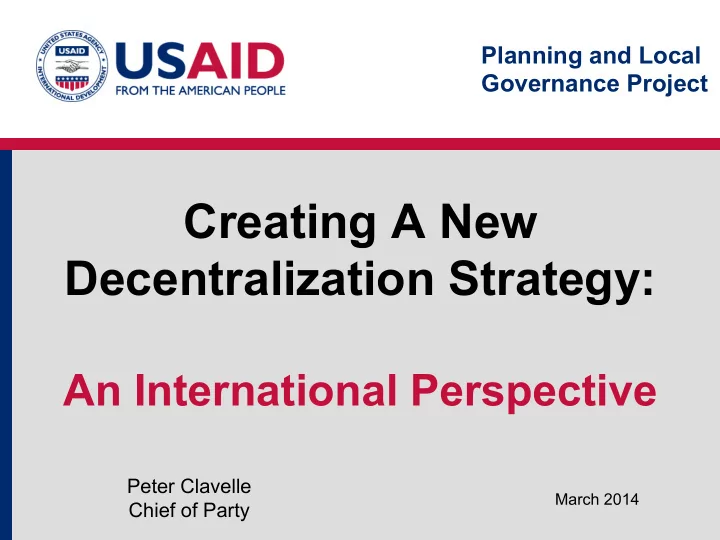

Planning and Local Governance Project Creating A New Decentralization Strategy: An International Perspective Peter Clavelle March 2014 Chief of Party
Planning and Local Governance Project Decentralization Overview • Much progress since 1992 • Basic legal framework • Expenditure assignments reasonably clear (except shared functions) • Own source revenues defined • LG capacity improving
Planning and Local Governance Project But – Progress Stalled • No decentralization strategy since 2006 • Little policy dialogue and consensus building • Fragmented local government associations • Too many LGUs • Many LGUs unable to provide services • No Law on Local Finances • Own source revenues shrinking • Huge gap between responsibilities and resources • Intergovernmental transfers unpredictable • Inability to borrow
Planning and Local Governance Project Compared to Other Countries Albania is: • Lowest LG Revenues as share of GDP • One of few countries not sharing personal income tax • 2 nd lowest property tax revenue as % of GDP • Lowest LG investment spending as share or GDP • Local government borrowing extremely low
Planning and Local Governance Project Conclusions • Fiscal decentralization not well developed • Actions required to reverse trends and improve local governance situation • Administrative-territorial reform underway • Must be accompanied by other reforms • 2014 – milestone year for decentralization and local governance
Planning and Local Governance Project International Experience • Key ingredients to successful decentralization: 1. Well-developed decentralization strategy 2. High level of dialog
Planning and Local Governance Project Key Actions Requiring Consensus • A new National Decentralization Strategy; • Administrative-Territorial Reform
Planning and Local Governance Project Key Issues 1. Develop Inclusive Institutional Mechanism for Central/ Local Government Consultation 2. Reconcile Expenditure Assignments to Administrative- Territorial Structures 3. Define the Expenditure Assignments 4. Develop Fiscal Decentralization Strategy 5. Structure Local Government Borrowing 6. Reform the LGU Revenue System 7. Develop Synchronized Sequence of Decentralization Process with Other Reforms (territorial planning, water, anti-corruption and Solid Waste
Planning and Local Governance Project Agree on Priorities for Decentralization Reform • Adopt Administrative-Territorial Reform • Development of Fiscal Decentralization – Law on Local Government Finance – Revise the Transfer/Grant System – Improve Own Source Revenues – Allow for Local Government Borrowing
Planning and Local Governance Project Agree on Priorities for Decentralization Reform Revise Legal Framework • Law 8652 Revisions • Revise Electoral Code • Role of Regional Units/Second Tier
Planning and Local Governance Project Next Steps (1) • Define Structured Process – Step 1: Carry out National Dialogue • Decentralization Working Group – Convenes on March 28 – Step 2: Develop White Paper/Decentralization Strategy • Sector Assessments (shared functions) • National Decentralization Strategy by July 2014 – Step 3: Adopt Legal Framework • Revise Law 8652 and Related Laws • Election Law • Local Government Finance Law • Administrative-Territorial Reform • Comprehensive intet-governmental fiscal relations system
Planning and Local Governance Project Next Steps (2) • Step 4: Develop the Implementing Regulations • Step 5: Implement the Decentralization Program • Step 6: Monitor, Evaluate and Retrofit
Planning and Local Governance Project
Recommend
More recommend